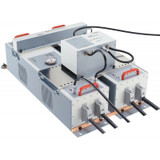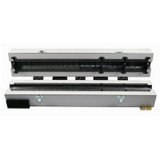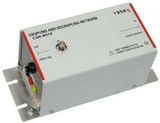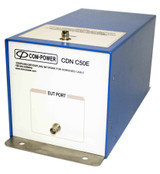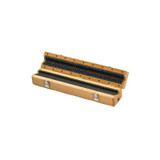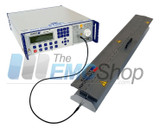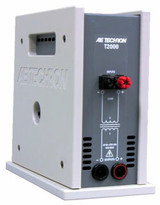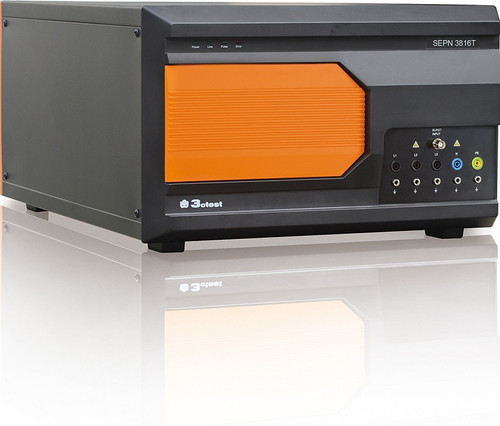Coupling Decoupling Networks (CDN's) Categories
Coupling Decoupling Networks (CDN's) Test Equipment, Systems & Solutions
-
Teseq CDN ST08 Coupling Decoupling Network
SKU: 8413
Frequency Range: 10 kHz to 80 MHzApplication: CDN for screened eight lines with RJ45 connectorCurrent Rating: 1000 mAEUT Connector: BNC 50 ΩCommon mode impedance (EUT Port) 10 kHz to 26 MHz: 150 Ω ±20 ΩCommon mode impedance (EUT Port) 26 MHz to 80 MHz: 150 Ω +60 Ω /-45 ΩRF Voltage: <20 V$1,600.00Typically in Stock -
3ctest TPT-7637-4C100 Coupling Transformer ISO 7637-4 Pulse B
SKU: 8736
Frequency Range: 1 kHz – 300 kHzMax Unsaturated Voltage: 100 @ f ≥ 1 kHzMax Current: 32EUT Max Current: 100Test Standards: ISO 7637-4In Stock -
CDN-M3-32A-HV AC + DC 1000V RF Coupling/Decoupling Network
SKU: 12165
Application/Test Type: unscreened supply lines (mains) AC + DC, RF Conducted DisturbancesCurrent Rating: up to 32 AmpsMax Voltage: up to 1,000 VoltsFrequency Range: 150 kHz to 230 MHzMains & EUT Connections: banana socketsRF Connector: 50 Ω BNC (Female)Standards Met: IEC / EN 61000-4-6Associated Equipment: RF Conducted Immunity Test SystemsInquire for Availability -
Teseq CDN M532 5-Line/32 Amp RF Coupling/Decoupling Network
SKU: 12093
Associated Equipment: RF Conducted Immunity Test SystemsCommon Mode Impedance: 150 kHz to 26 MHz: 150 Ω ±20 Ω; 26 MHz to 230 MHz: 150 Ω +60 Ω / -45 ΩCurrent Rating: 32 Amps MaximumDecoupling of Common Mode Disturbance: Greater than 30 dBDimensions: 6.3 x 6.3 x 20 inches (16.0 cm x 16.0 cm x 50.0 cm)Insertion Loss: Greater than 0.1 dBMains & EUT Connections: 4 mm, safety (Optional IEC 320 16A)RF Connector: BNC, 50 ΩRF Input Voltage: Less than 30 VStandards Met: IEC 61000-4-6Voltage Division Factor: 10 dB +3 dB / -1 dBEMC Test Standard: IEC/EN 61000-4-6 -
Schwarzbeck CDN S19 HDMI Coupling Decoupling Network
SKU: 8418
Frequency Range: 150 kHz - 230 MHzMax. RF Test Voltage: 30 VMax. RF Input Power: 6 W (continuous)RF Input Connector: 50 Ω BNC femaleEuT, AE Connectors: HDMI femaleTest Standards: IEC/EN 61000-4-6Associated Equipment: RF Conducted Immunity Test Systems$230.00In Stock -
3ctest CDN ST8 Coupling/Decoupling Network For Shielded Symmetric Line
SKU: sku-1702
Frequency Range: 150 KHz - 230 MHzMax. AC voltage (line to ground): 100 VMax. DC voltage (line to ground): 150 VRF Input Port: <20V (BNC)Standard Met: IEC 61000-4-6$1,195.00Lead time 10-12 weeks -
Schwarzbeck CDN USB-C Coupling Decoupling Network for IEC 61000-4-6
SKU: 8420
Associated Equipment: RF Conducted Immunity Test SystemsTest Standards: IEC/EN 61000-4-6Frequency Range: 150 kHz - 230 MHzCommon Mode Impedance: 150 kHz – 24 MHz: 150 Ω ±20 Ω, 24 MHz–80 MHz: 150 Ω +60 Ω / -45 Ω, 80 MHz–230 MHz: 150 Ω ±60 ΩMax. RF-Test Voltage (emf): 30 VoltsRF-input-power: 6 W (continuous)RF-input-connector: 50 Ω BNC (female)$220.00Typically In Stock -
3ctest CDN 418TH8 CDN For Unshielded Symmetric High-Speed
SKU: sku-1116
Communication Frequency: 10 MHz, 100 MHz, 1000 MHz, 10 MB, 100 MB, 1000 MBStandard Met: IEC 61000-4-8Pulse Voltage: 4 kVCoupling Mode: 4-pair unshielded symmetricConnector: RJ45 female connectorTypically In Stock -
-
-
Teseq (Schaffner) CDN 163 3-Phase, 100 Amp EFT/Burst Coupling Network
SKU: 1064
Applications: Electrical Fast Transient ImmunityTest Standards: IEC/EN 61000-4-4Industry: EMC Precompliance Testing, CE Marking, Medical Devices, Industrial Machinery, Electronics & ITFor Use With: Any Burst/EFT GeneratorTypically In Stock -
EFT-DLC EFT/Burst Capacitive Coupling Clamp for Data Lines
SKU: 1780
Application/Test Type: Electrical Fast Transients on Data Lines (EFT Burst)Built in Accordance to: IEC 61000-4-4Coupling Length: 1 m (39.4 in)Compatible Impulse Generators: Any EFT/Burst Generators (custom HV cable may be required)RF Connector: Fischer HV ConnectorVoltage Rating: up to 5.0 kV$195.00In Stock


